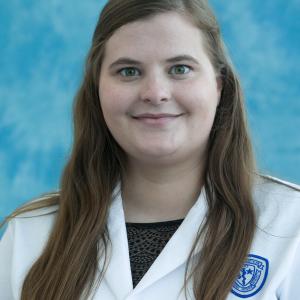Class Year: 2025
Program Major: Doctor of Medicine
In her second year at Case Western Reserve University School of Medicine, Danielle Herman already has made one commitment to her future patients: She won't let them learn difficult news online, as she did. Her recent cancer diagnosis and the miscommunication surrounding the news have strengthened her desire to become a caring physician and inspired her advocacy for early cancer detection.
In late October 2022, Herman’s doctor noticed an asymmetry in her neck during a routine physical exam and ordered an ultrasound.
Days later, Herman saw that the results had been uploaded to her online medical chart, but she said she hadn't heard from her doctor.
(Typically, results of biopsies and other potentially high-stakes tests are posted on a delayed basis to give healthcare providers the opportunity to share the information personally. This approach gives the patient an opportunity to ask questions in real time.)
But for the ultrasound—and her follow-up fine-needle aspiration biopsy—Herman says she didn’t hear from her doctor and instead read the results online. The ultrasound results were “‘highly suspicious for underlying malignancy and included two cancer characteristics I had learned about in medical school,” said Herman, adding she immediately started crying once she read the ultrasound interpretation. The follow-up biopsy result, as Herman also learned online, was “suspicious for papillary thyroid carcinoma."
Herman switched providers, and her new doctor is not only treating her cancer, but also inspiring the way Herman will care for future patients.
“One of the things my endocrinologist told me during an initial appointment was, ‘This won’t affect how long or how well you live.’ It was such a comforting thing to hear, even though I knew from my background that the prognosis from thyroid cancer is very good,” said Herman, who recognizes the unique learning opportunity she has as a cancer patient and medical student. “Even if someone knows something or may have heard it or read it—really reinforcing those reassuring statements makes a big difference.”
A surgeon removed her thyroid gland and she will begin radioactive iodine therapy soon.
Herman said the less-than-ideal way she learned her diagnosis coincided with communication workshops at the School of Medicine designed to teach students how to give bad news to patients. She appreciates the school’s curriculum for teaching future physicians to be empathetic and supportive as they deliver challenging diagnoses. In fact, the approach is part of the reason she chose Case Western Reserve after attending Princeton University for her undergraduate degree.
“Case Western Reserve University really emphasizes the humanistic side of medicine through the Tuesday seminar and communication workshops,” said Herman.
She added that one of her professors talks about how you’ll know a Case Western Reserve-trained physician by certain things they do.
“You always knock even if the door is open—things like that, just small things,” Herman said. “I think it's really emblematic of the larger culture of really emphasizing not just knowing a lot about medicine—but also practicing and being a good doctor and being a good support for people.”
Herman is thankful her father has always encouraged her to prioritize her health—regularly asking if she scheduled her annual physical and recommended blood work and received immunizations. Now she’s encouraging others to do the same.
“As a medical student—as a member of the community—I think it’s really important to increase education about self-exams and also the importance of getting your annual physicals,” Herman said.
Herman plans to specialize in psychiatry and says her mom (a healthcare provider) and her twin sister (who is starting medical school) continue to inspire her journey as a medical student. She spends her free time volunteering with Crisis Text Line and socializing with medical school friends.


